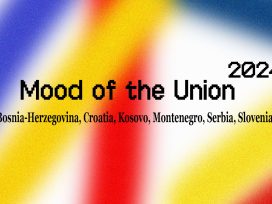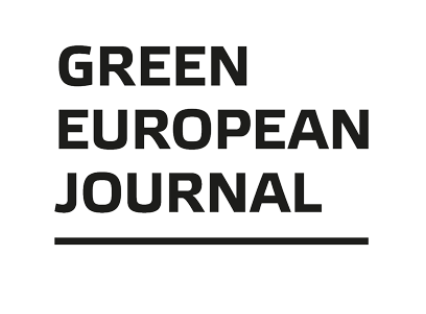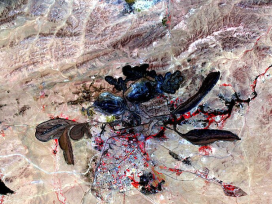The battle over Serbia’s lithium
Plans to exploit Serbia’s lithium, seemingly shelved two years ago, are back on the table. Germany and the EU appear willing to overlook president Aleksandar Vučić’s abuses of power to access the precious metal. Will their double-standards collaboration with Serbia’s right-wing government undermine citizen trust in EU accession?
After Ana Brnabić, former Prime Minister of Serbia, issued a statement on 20 January 2022, it seemed that the country’s story of lithium exploitation was over. ‘The regulation on the spatial plan for the Jadar project … has been repealed. We never had contracts,’ stated Brnabić. ‘We have met all the demands of the environmental protests and brought an end to Rio Tinto in the Republic of Serbia.’ But the ensuing calm only lasted until the summer of 2024, when lithium, like a boomerang, returned to public discourse. Lithium exploitation is very much back on the socio-table.
Beneath the surface
Preparations for lithium extraction in Serbia became news in 2020, when residents from the western Serbian municipality of Loznica and ecological organisations uncovered multinational Rio Tinto’s intended mining project. While the company’s controversial plans may have officially been stopped in 2022, locals have repeatedly reported that Rio Tinto is still purchasing land and carrying out preparatory work despite losing its work permits. The company has even sponsored sports clubs and cultural events in places near the planned, yet halted, mine. Something is brewing beneath the surface; the project seems only to be temporarily on hold.
Environmental activists and certain supportive political parties, who had demanded a legal ban on the extraction of lithium and boron ores in Gornje Nedeljice, Loznica, clearly wanted to permanently protect local residents. But, before the general elections in April 2022, right-wing Serbian Progressive Party (SNS) politicians – already in power for a decade – had pushed the issue under the carpet to avoid any political risk.
When the SNS secured a parliamentary majority, Aleksandar Vučić was re-elected as president. The governing party’s authoritative control, favouring nationalist topics spiced with neoliberal economic politics, seemed assured. However, Green representatives entered parliament for the first time and highlighted the lithium issue at an institutional level, raising frequently unanswered questions and demands in parliament. Vučić insisted that a great opportunity for development had been missed, while Brnabić claimed that Serbia would have to pay large sums in compensation to the multinational company for the cancelled project.

Protest against lithium mining in Belgrade on 10 August 2024. Image by Emilija Knezevic via Wikimedia commons.
Snap elections and protests
Serbian socio-political issues then took a sudden violent turn in the spring of 2023, when two mass shootings, in which 19 children and young people were killed, and 18 others were wounded, occurred just one day apart. The events shook the entire country, sparking mass protests, which disrupted everyday social structures and led to parliamentary, Belgrade city assembly, regional, and some local elections.
In December’s snap elections, the pro-European opposition ran together under a ‘Serbia Against Violence’ banner, achieving the best result for an opposition coalition since 2012, with Radomir Lazović, co-president of the Green-Left Front (ZLF), leading the list. Unprecedented allegations of vote rigging also marked the elections, resulting in new protests and a struggle at all levels to contest the results. European Green and Social Democratic parties played a significant role in exposing electoral fraud in Belgrade and nationally. The ensuing political instability lasted until the Belgrade elections were repeated alongside regular local elections in early June 2024. In this rerun, the fragmented opposition, which in part boycotted the elections and campaigned against the opposition that chose to participate, led to poorer results and renewed victory for the SNS.
Once the elections were over, the issue of lithium mining resurfaced. According to data from the Bureau for Social Research (BIRODI) monitoring the media, lithium mining was mentioned only 37 times in national broadcasts in May 2024, 330 times in June, and 1,045 times in July. Most of these segments were favourably oriented towards lithium extraction, even though public opinion remained over 50 per cent opposed. During this period, state officials primarily acted as PR agents, loudly promoting the supposed positive aspects of lithium mining in Serbia.
The government’s position sparked public outrage. During the summer, a series of mostly self-organised protests spread across Serbia. The call to action rose in Loznica, the city closest to the planned mine, then expanded to nearly every city in Serbia, culminating in Belgrade, where in mid-August, during a heat wave at the height of the holiday season, tens of thousands of people gathered. The slogan of these protests and the entire movement, Nećeš kopati (‘you won’t dig’), became widespread. Chants could be heard at parliament, sporting events, concerts, and other mass gatherings.
Simultaneously, Rio Tinto became increasingly present in the public sphere through media responses to activists, hiring lobbyists, and receiving support from within ruling political parties. It became clear that the lithium exploitation project was back in full force in July 2024, when the Constitutional Court overturned the Serbian government’s decision to halt the Jadar project, stating that it was ‘not in accordance with the Constitution and the law‘.
After the decision, Biljana Đorđević, member of parliament and co-president of the ZLF, publicly raised a question: ‘Is former Prime Minister Ana Brnabić just incompetent for drafting an unconstitutional regulation on ending the Jadar project and thereby exposing the state to a potential lawsuit, or is she merely a corrupt lobbyist for Rio Tinto?’
The EU and German Greens
On 19 July 2024, just days after the Constitutional Court’s ruling, a German and European Commission delegation visited Belgrade: Chancellor Olaf Scholz; State Secretary for Economic Affairs and Climate Action and Green member of the Bundestag, Franziska Brantner; European Commission Vice President for the Energy Union, Maroš Šefčovič; and German industrialists. Their summer visit realised a Memorandum of Understanding (MoU) launching a Strategic Partnership between the Republic of Serbia and the European Union on sustainable raw materials, battery value chains, and electric vehicles. In other words, Serbia has lithium reserves that are useful to the German car industry. This aligned with the European Critical Raw Materials Act, which aims to shorten the supply and processing chains of materials such as lithium for the net zero industry.
Contesting the Serbian government on democracy, media freedom, the rule of law, its relations with Kosovo, and issues with other neighbouring countries appears to have slipped for the sake of accessing lithium. Despite a change in Germany’s ruling coalition since the last German Chancellor’s visit to Serbia, the goals remain the same. Scholz wants the same lithium that Angela Merkel wanted on her last international visit and is willing to legitimise Serbia’s autocratic regime to do so.
At a joint press conference, President Vučić mentioned his joint guarantee on environmental protection with Franziska Brantner. However, this constructive cooperation is in effect an attempt to shift responsibility for any potential environmental degradation from himself to Germany, especially to the German Greens. While Vučić knows full well that only the Serbian state can determine that the project will meet the highest environmental standards, he still chooses to delegate responsibility. Vučić’s corroborative tone sends a clear message: he might not like the German Greens, but he considers them reasonable, unlike domestic Greens opposing such a ‘great’ project. This strategy legitimizes the president while attempting to marginalize local green actors.
Rather than supporting Serbians, who are largely against lithium mining, as illustrated by their protests and blockades, Brantner and the German Green Party are taking the opposite stance. It is not a stance that proposes how the citizens of Serbia could resolve this issue internally without external pressure but rather one focused on insistently pursuing lithium for the decarbonization of a foreign car industry. It appears geopolitics has once again prevailed over ideals, and the priority is to secure Serbia’s lithium before China or Russia. As Brantner states: ‘It’s not a question of ‘whether the project will happen’, but ‘whether Rio Tinto’s project will be carried out with European partners or the Chinese’. I don’t believe a Chinese-Serbian partnership would be better for democracy, the environment, and the local population. However, Brantner’s perspective overlooks how Serbian institutions are completely undermined: there is no rule of law or democracy. In such conditions, the decision on lithium mining would be forcibly imposed.
As a result, Serbian citizens opposing lithium mining perceive the German Green Party as a malignant force seeking to harm them. They fear that Serbia could become a sacrificial zone for the European green transition. If this pressure continues, it raises the question of how long it will take for Serbia and progressive political actors to recover. Support for joining the European Union would likely continue to decline, even though it is already the lowest of all countries negotiating for or in the process of joining the EU.
Serbian right-wing narratives that equate the EU-backed exploitation of lithium with the ‘stealing’ of Kosovo or Bosnia’s Serbian entity, Republika Srpska, by foreign powers will continue to strengthen. Scholz and Brantner’s visit only seems to benefit Vučić and the right-wing opposition, which the president already heavily influences. Serbia’s few progressive actors are left in a worsening position, having to explain how they can oppose lithium exploitation while still supporting EU accession, given the EU’s unethical pursuit of lithium.
The ZLF, a party on the verge of joining the European Green Party (EGP), has undertaken various international activities to show Serbian citizens that European politics is neither homogeneous nor monolithic. Many parties, organisations, and individuals oppose the planned lithium mining in Serbia. The EGP is the first pan-European party to issue statements that clearly oppose the project. Croatia’s left-wing Green party, Možemo, supports Serbian citizens in their struggle, fostering regional cooperation that contrasts with the dominant nationalist narratives in both countries.
Local activists receive support from experts, politicians, and their counterparts in countries from Portugal to Georgia. International backing is essential for broadening the movement against an activity that threatens environmental degradation. The development paradigm pushing for a new wave of extractivism and greenwashing neo-imperialism has to change.
What’s next?
United opposition parties in the Serbian parliament jointly submitted a proposal to amend the mining law, which would impose a long-term ban on the exploration and mining of lithium and boron ore throughout the country. This proposal represents another attempt to prevent the lithium extraction project in western Serbia through institutional means. While opposition members of parliament point out environmental, economic, social, and other risks, the ruling party argues that such amendments would destroy the mining industry, even though there are currently no active boron or lithium mines in Serbia. Other arguments suggest that this proposal would halt economic growth, as Serbia would have to pay compensation to Rio Tinto. The blame is often shifted onto the opposition for introducing the company to Serbia in the early 2000s, despite many current members of parliament having been at school or just starting university at the time.
Rather than political dialogue, the SNS is calling for expert analysis. However, local residents of western Serbia, activists, and politicians who oppose the project emphasise that the time for analysis is over; they have been appealing for in-depth assessments for years, with the company and government representatives avoiding accountability. After a four-day parliamentary debate in October 2024, which eventually culminated in a ballot rather than a public roll call vote, the proposal to ban the exploration and mining of lithium and boron was rejected: 128 votes against, 84 in favour.
It is expected that the ruling party, with the help of its media and institutions, will now work on further damage control and diluting the debate. Their argument asserts that there is still time before the potential construction of the mine. They declare that experts should exclusively make the decision, while simultaneously discrediting numerous experts who oppose the project. In the meantime, as institutional mechanisms are yielding no results, local residents, activists, and other anti-mine actors are gradually preparing for further counteraction. Plans for new protests and blockades are being announced despite increasingly repressive state control – over 40 activists were brought in for questioning or arrested during the summer for their role in calling for resistance to the lithium mining project.
It seems that ‘lithium’ will continue to be the word in Serbian society in the upcoming period. Besides uniting the country’s rather heterogeneous activist and political scene, discussions about lithium mining could also focus debate on what kind of society Serbians want to live in, what their real needs are, and what a just energy and social transition should look like.
Published 7 January 2025
Original in English
First published by Green European Journal
Contributed by Green European Journal © Predrag Momčilović / Green European Journal / Eurozine
PDF/PRINTIn collaboration with
Newsletter
Subscribe to know what’s worth thinking about.
Related Articles

After six months of protests, there are grounds for hope that the tide is turning in favour of the Serbian student movement: first, the unification of the opposition around the movement’s demand for new elections; second, the emergence of a strategic alliance between the students and the EU.

Balkan realities
Bosnia-Herzegovina, Croatia, Kosovo, Montenegro, Serbia, Slovenia
Since Russia’s full-scale invasion of Ukraine, the EU’s rhetoric on enlargement in the Western Balkans has taken an optimistic turn. Whether that continues depends on the European vote. But whatever the result, it is the political realities that count. And in the Balkans, these are far from consistently pro-European.





